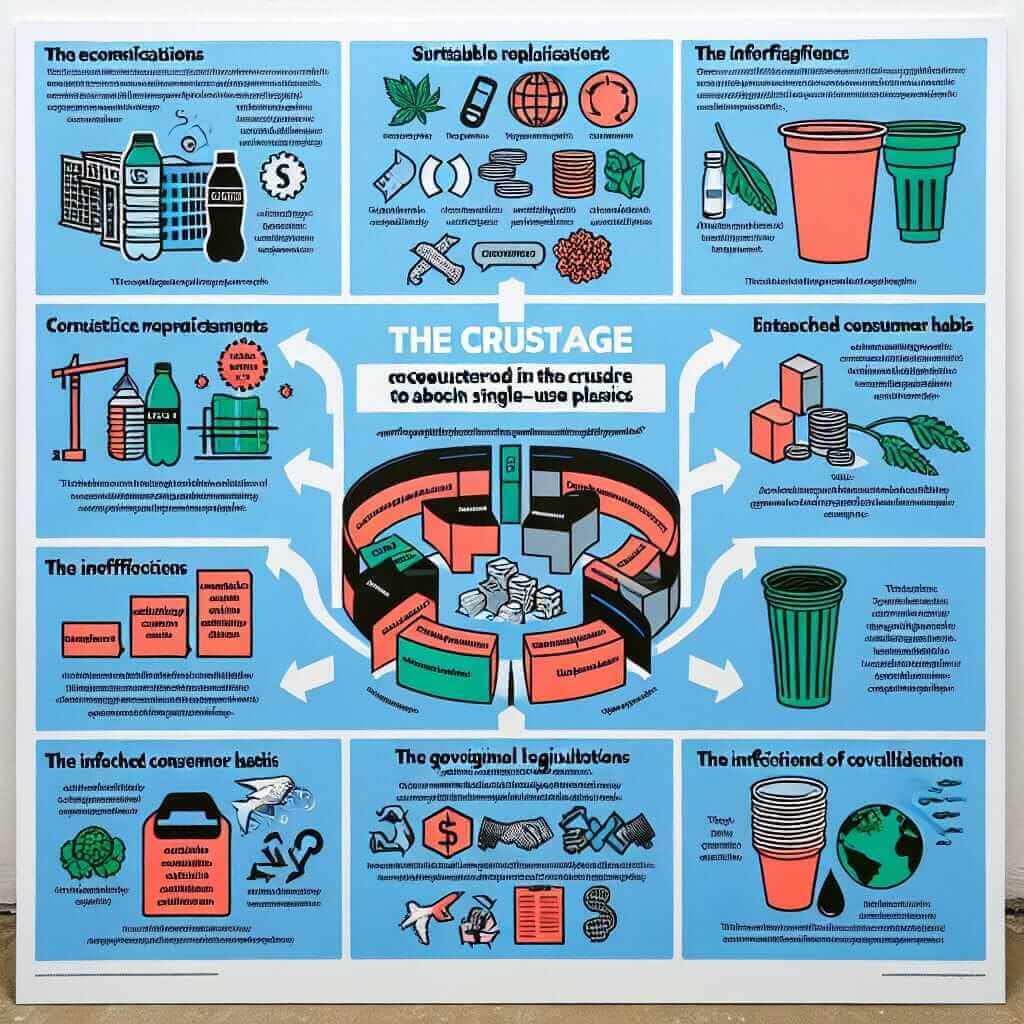The IELTS Reading section requires candidates to read passages and answer questions to demonstrate their comprehension skills. One trending topic that’s increasingly relevant is the issue of single-use plastics and the challenges related to their elimination. This subject is not just current but has also appeared in past IELTS tests, making it an excellent choice for practice.
Nội dung bài viết
IELTS Reading Practice: Elimination of Single-Use Plastics
In this section, we provide a reading passage, followed by a set of questions and answers to help you prepare for the IELTS Reading exam.
Reading Passage
Title: The Challenges of Eliminating Single-Use Plastics
Single-use plastics, including items like plastic bags, straws, and water bottles, are ubiquitous in modern society. Despite the convenience they offer, these plastics pose significant environmental challenges. Below, we explore the main challenges faced in eliminating single-use plastics.
Main Challenges
-
Economic Impact: One of the foremost challenges is the economic impact. Many industries rely heavily on plastic because it is a cheap and versatile material. Manufacturing, transportation, and even retail sectors could see substantial cost increases by switching to alternative materials.
-
Lack of Alternatives: While there are alternatives to single-use plastics, they are often not as effective or affordable. For example, biodegradable plastics and reusable containers can be prohibitively expensive and may not be as convenient for consumers.
-
Consumer Behavior: Changing consumer behavior is another significant hurdle. People are accustomed to the convenience of single-use plastics, and altering these habits requires comprehensive educational campaigns and incentives.
-
Recycling Inefficiencies: Many regions lack the infrastructure to recycle plastics efficiently. Consequently, a significant amount of plastic waste ends up in landfills or, worse, in natural environments like oceans and forests.
-
Government Policies: Effective elimination of single-use plastics requires strong government policies and regulations. However, such measures are often met with resistance from industries and consumers alike, limiting their effectiveness.
-
Environmental Considerations: Ironically, some alternatives to single-use plastics, such as certain types of biodegradable plastics, can also negatively impact the environment. The full life cycle of these materials needs to be assessed to ensure they are genuinely better for the planet.

By understanding these challenges, we can better address the root problems and work towards a sustainable future. However, it is clear that the road to eliminating single-use plastics is fraught with difficulties that cannot be overlooked.
Reading Questions
Question Type: Multiple Choice
-
According to the passage, what is one of the primary reasons industries rely on single-use plastics?
a. They are environmentally friendly.
b. They are cheap and versatile.
c. They are easy to recycle.
d. They are sanctioned by government policies. -
Which of the following is NOT mentioned as a challenge in eliminating single-use plastics?
a. Economic impact
b. Lack of alternatives
c. Consumer convenience
d. Government efficiency
Question Type: True/False/Not Given
- True/False/Not Given: The passage suggests that biodegradable plastics are always a better alternative to single-use plastics.
- True/False/Not Given: Government policies alone are sufficient to eliminate single-use plastics.
Question Type: Matching Information
-
Match the following challenges with their descriptions:
- A. Economic Impact
- B. Lack of Alternatives
- C. Consumer Behavior
i. Many people are used to the convenience provided by single-use plastics.
ii. Switching to other materials could be costly for various industries.
iii. Biodegradable plastics and other materials are often more expensive.
Answer Keys and Explanations
- B – Industries rely on single-use plastics because they are cheap and versatile.
- D – Government efficiency is not mentioned as a challenge.
- False – The passage highlights that some biodegradable plastics can negatively impact the environment.
- Not Given – The passage does not state that government policies alone are sufficient.
- A-ii, B-iii, C-i
Common Mistakes
- Misunderstanding the question: Ensure you understand what the question is asking. Re-read if necessary.
- Overlooking details: Pay attention to specific details in the passage that answer the question directly.
- Relying on assumptions: Base your answers on information provided in the passage, not on prior knowledge or assumptions.
Vocabulary
- Ubiquitous (adj) /juːˈbɪkwɪtəs/: present, appearing, or found everywhere.
- Prohibitively (adv) /prəʊˈhɪbɪtɪvli/: in a way that is too expensive or too much to pay.
- Incentive (noun) /ɪnˈsɛntɪv/: something that motivates or encourages someone to do something.
- Infrastructure (noun) /ˈɪnfrəˌstrʌkʧər/: the basic physical and organizational structures needed for the operation of a society or enterprise.
Grammar
-
Relative Clauses: These are used to give additional information about a subject. Example: “People are accustomed to the convenience of single-use plastics, which requires comprehensive educational campaigns and incentives to change.”
-
Passive Voice: Often used to focus on the action rather than who performs it. Example: “Many regions lack the infrastructure to recycle plastics efficiently.”
Conclusion
Eliminating single-use plastics is a complex issue with many challenges. Understanding these challenges can help in developing better strategies for a sustainable future. For your IELTS Reading preparation, practice reading similar passages and answering questions to enhance your comprehension skills. Remember to focus on key details and understand the context of each passage.
Additional Tips for High IELTS Reading Scores
- Practice regularly with diverse reading materials.
- Familiarize yourself with different question types.
- Manage your time effectively during the test.
- Focus on understanding both the main ideas and specific details.
Good luck with your IELTS preparation!
Feel free to adjust the text according to your specific needs.